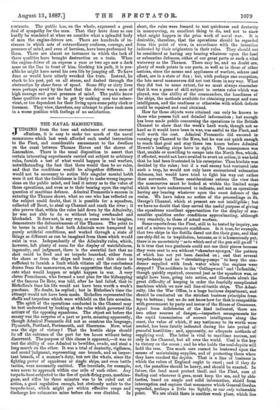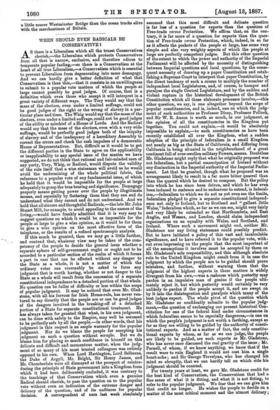THE NAVAL MANCEIIVECES.
JI:WING from the tone and substance of some current effusions, it is easy to make too much of the naval manceuvres which last week afforded such useful instruction to the Fleet, and considerable amusement to the dwellers on the coast between Thames Haven and the shores of Lancashire. There is the usual disposition to assert that certain interesting experiments- carried out subject to arbitrary rules, furnish a test of what would happen in real warfare, notwithstanding the fact that there would then be no rules, and that the conditions would be altogether different. It would not be necessary to notice this singular mental habit were it not that the foolishness is likely to make wrong impres- sions on the public mind, and lead it astray as to the value of these operations, and even as to their bearing upon the capital question of maritime defence. Admiral Fremantle's success in entering the Thames shows, what no one who has reflected on the subject could doubt, that it is possible for a squadron, collected off Brest, to !steal up Channel and reach the river ; it also proves that, within the rules laid down by the Admiralty, he was not able to do so without being overhauled and blockaded. It does not, in any way, as some seem to imagine, demonstrate the defencelessness of the Thames. The point to be borne in mind is that both Admirals were hampered by purely artificial conditions, and worked through a state of things as different as can be imagined from those which would exist in war. Independently of the Admiralty rules, which, however, left plenty of room for the display of watchfulness, ingenuity, and judgment, there is the essential fact that no shot could be fired and no torpedo launched, either from the shore or from the ships and boats ; and this alone is sufficient to furnish a limit which vitiates all the conclusions dream from the manceuvres, on the suppositioe that they inffi- este what would happen or might happen in war. A very clever Frenchman, who formed a neat plan for the kidnapping of the famous Be Betz, was told, after he had failed, that in Bithelieu's time his life would not have been worth a week's purchase. No doubt, he replied.; but in Rithelien's time the attempt would not have been made. Richelieu represented the dies and torpedoes which were withheld on the late occasion.
The spirit of the operations conducted in the Channel may be best understood by looking at the rules which governed the actions' of the opposing squadrons. The object set before the enemy-leas the surprise of a pert or ports, meaning apparently, thotret-Admiral Fremantle did not so construe the language, Plymouth, Portland, Portsmouth, and Sheerness. Now, what was the sign of victory? That the hostile ships should lie off the entrance of the port for ten hence without being discovered. The purpose of this clause is apparent,—it was to test the ability of one Admiral to bewilder, evade, and steal a long march on the other. It was a trial of dexterity, vigilance, and soundludgment, representing one branch, and an impor- tant branch, of a seaman's duty, but not the whole, since the fighting power of squadrons or single ships, and even battle tactics, were necessarily omitted. The ironclads, for example, were never to approach within one mile of each other. Any torpedo-boat subjected to the fire of quick-firing guns, machine- guns; and rifles for three minutes was to be ruled out of action, a good regulation enough, but obviously unfair to the torpedo-boat, which might get within effective range and discharge her submarine mine 'before she was disabled. In short, the rules were framed to test quickness and dexterity in manceuvring, an excellent thing to do, and not to show what might happen in the grim work of naval war. It i8 desirable, therefore, that the operations should be regarded from this point of view, in accordance with the intention indicated by their originators in their rules. They should not be considered as having any bearing whatever upon the laud or submarine defences, either of our great ports or such a vital waterway as the Thames. There may be, and no doubt are, plenty of weak points in our ports, as well as in those of other nations, since the means and appliances of warfare, ashore aid afloat, are in a state of flux; but, with perhaps one exception, the late naval manceuvres did not test them in any way. What they did test to some extent, for we must always remember that it was a game of skill subject to certain rules which was played, was the ability of the commanders, the handiness of the ships, the methods available for obtaining prompt and sure intelligence, and the readiness or otherwise with which defects could be repaired and coal obtained.
How far these objects were attained can only be known to those who possess full and detailed information ;_ bat enough has been made public concerning the operations in the British Channel to show that the week's hard work, though not so hard as it would have been in war, was useful to the Fleet, and- well worth the cost. Admiral Fremantle did succeed in running up Channel to the Nore, but he was not quick enough to reach that goal and stay there ten hours before Admiral Hewett's leading ships hove in eight. The consequence was that, unable or unwilling to escape into the North Sea, which, if effected, would not have availed to avert an actionrit was held that he had been frustrated in his enterprise. Thus his fate was decided by the rules ; but if a real enemy had ventured into such a trap, he would not only have encountered submarine
defences, but would have tried to fight his way out rather than surrender. These considerations enforce the view that
the mauceuvres must be looked at within the limited scope which we have endeavoured to indicate, and not as operations having any bearing whatever upon the coast defence of the realm. We have taken no notice of the proceedings in St. George's Channel, which at present are not intelligible ; but we have no doubt that they served the useful purpose of giving the squadrons excellent opportunities for the display of 8€11. manlike qualities under conditions approximating, although very remotely, to those of actual warfare.
Some reports from the Fleet, still to be tested by inquiry, are not of a nature to promote confidence. Is it true, for example, that two ships in the flotilla dared not fire their guns, and that one ship did so in trepidation, because, as it is humorously pat, there is an uncertainty " as to which end of the gun will go off "? Ea it true that two gunboats could not use their pieces because they were sent to sea without "chamber-sponges," the pattern of which has not yet been decided on ; and that several torpedo-beats had no " circtilating-pumps " to keep the con- denser supplied with fresh water when the engines were stopped ? The accidents to the • Collingwood ' and 'Inflexible,' though quickly repaired, occurred just as the squadron was, or
• might have been, going into action, and illustrate afresh the great difficulty of keeping in order the fearfully complicated machines which we now call line-of-battle ships. The Aden'. ralty, like the War Office, is a huge business department, and should be conducted on the strictest business principles front top to bottom ; bat we do not know how far that is compatible with government by party and terror of the House of Commons. Apart from deficiencies of the kind indicated, there are two other sources of dangee,—imperfect arrangements for the rapid transmission of correct intelligence along the coast, the value of which, if any testimony to its worth were needed, has been faintly indicated during the late period of peaceful hostilities ; and, apparently, no adequate methods of supplying coal. The latter is vital to maritime success, not only in the Channel, but all over the world. Coal is the key to victory on the ocean ; and he who holds the coal-depots will hold the seas. Too much care cannot be bestowed upon the MOM of maintaining supplies, and of protecting them when they have reached the depate. That is a line of business in which the rulers of England ought to excel ; and if they do not, the penalties should be heavy, and should be exacted. In future, the land must protect itself, and the Fleet, sure of finding coal wherever it goes, most keep the sea, and by able taetiee, based on ample and solid information, shield from interruption and capture that commerce which General Gordon regarded, perhaps a little too lightly, as our only vulnerable point. We are afraid there is another weak plate, which lies



































 Previous page
Previous page